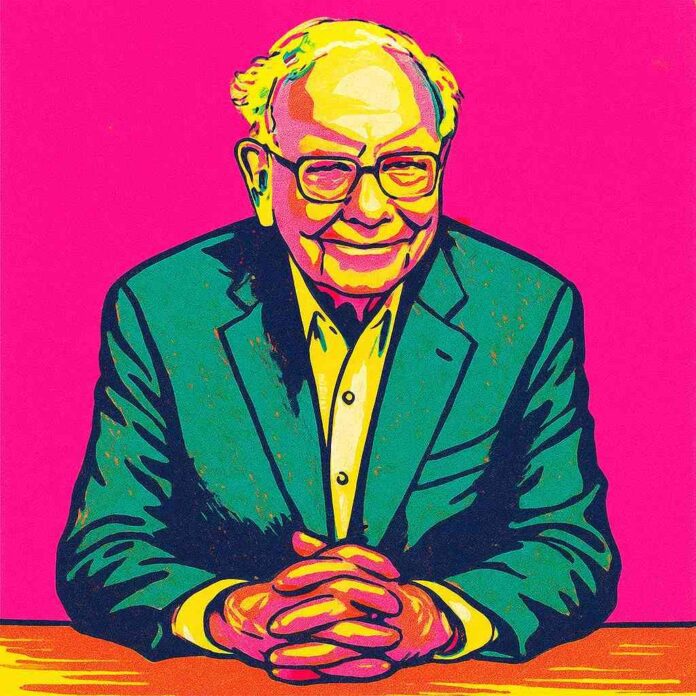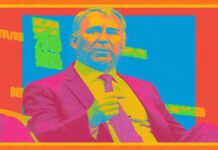Few investors have shaped modern finance as much as Warren Buffett, the “Oracle of Omaha.” For over six decades, Buffett has defined what it means to be a disciplined, long-term investor. His company, Berkshire Hathaway, has become a global powerhouse, spanning insurance, railroads, energy, consumer goods, and billions in equity holdings.
In 2025, at age 94, Buffett is preparing to step back from the CEO role at Berkshire Hathaway, handing day-to-day control to Greg Abel. Yet, his recent moves and reflections — from record profits and acquisitions to philanthropy — show that Buffett’s investing compass is still pointing true north. Perhaps nothing illustrates his flexibility and enduring wisdom more than his late embrace of Apple stock, his deliberate decision not to buy Microsoft, and his commitment to philanthropy with one of the largest personal fortunes in history.
Buffett’s Wealth and Status
As of mid-2025, Buffett’s net worth is estimated at around $130 billion, placing him consistently among the world’s top five richest individuals. Unlike some billionaires who diversify their fortunes into art, yachts, or private jets, almost all of Buffett’s wealth is tied to Berkshire Hathaway stock, reflecting his belief in long-term compounding and alignment with shareholders.
What makes Buffett unique is not just the size of his fortune, but his attitude toward it: he has pledged to give away 99% of his wealth to philanthropic causes during and after his lifetime. In interviews, he has often said that society benefits when wealth recirculates through good causes rather than being hoarded by heirs.
Buffett’s Philosophy: Simplicity, Discipline, Patience
Buffett’s philosophy is rooted in value investing, inherited from his teacher Benjamin Graham but adapted with his own flair. Instead of buying “cheap” stocks mechanically, Buffett seeks great businesses at fair prices.
His hallmarks:
- Invest within your circle of competence — only in businesses you truly understand.
- Look for economic moats — competitive advantages that protect long-term profits.
- Always demand a margin of safety.
- Hold for the long run — letting compounding do the heavy lifting.
- Preserve capital above all else — cutting losses quickly if wrong.
These timeless principles built Berkshire into a conglomerate with a market capitalization north of $850 billion.
The Apple Epiphany
For decades, Buffett famously avoided technology stocks. He argued they were outside his circle of competence: products changed too quickly, moats could erode overnight, and valuations were often speculative.
Buffett passed on companies like Intel, Cisco, and Amazon. But his biggest blind spot, by his own admission, was Apple (AAPL).
Why He Hesitated
For years, Buffett did not buy Apple, even as it became the most valuable company in the world. He said he couldn’t understand technology well enough to forecast its future. He also avoided Microsoft, not only because of his doubts about predicting software economics, but also out of friendship with Bill Gates, one of his closest friends. Buffett later admitted that he did not want even the appearance of insider knowledge influencing his decisions.
Why He Finally Bought
It was only in 2016–2017 that Buffett changed his mind. After carefully studying Apple’s business model, he realized it was less about flashy technology and more about a consumer brand and ecosystem. The iPhone was not just a gadget but a lifestyle product with enormous customer loyalty — creating a moat as wide as Coca-Cola’s brand, one of Buffett’s longtime favorite holdings.
He remarked: “Apple is probably the best business I know in the world.”
The Payoff
Apple quickly became Berkshire’s largest equity holding, at one point making up over 40% of the portfolio. The stake, purchased for tens of billions, grew to be worth well over $150 billion, generating enormous unrealized gains and billions in dividends.
This late embrace of Apple underscored Buffett’s flexibility: even after decades of avoiding tech, he was willing to admit when a business model aligned with his principles of moat, brand, and pricing power. It became one of the most successful investments of his career.
Why He Never Bought Microsoft
In contrast, Buffett never bought Microsoft, despite his deep friendship with Gates and his recognition of the company’s dominance.
The reason was not a lack of admiration. Buffett has often called Microsoft one of the greatest businesses of all time. But he worried that his close personal relationship with Gates, Microsoft’s co-founder, would create a conflict of interest or perception of insider advantage.
Buffett explained: “It just would have looked wrong for me to buy Microsoft because I knew Bill, and people would assume I had information.”
This decision reflects another Buffett hallmark: integrity and prudence. For him, avoiding even the appearance of impropriety was worth missing out on massive profits.
Recent Triumphs in 2025
Despite his age and the transition of leadership, Buffett’s recent record proves he is still a force.
1. Record Profits at Berkshire
In early 2025, Berkshire reported record operating profits of nearly $47.4 billion, up 27% from the previous year. Insurance units thrived, investments rebounded, and Class A shares hit all-time highs. Buffett’s model of diversification again proved resilient.
2. The OxyChem $10 Billion Deal
Berkshire is reportedly negotiating a $10 billion acquisition of Occidental Petroleum’s chemical unit (OxyChem). Since Berkshire already owns nearly 28% of Occidental’s equity, this deal would deepen its exposure to industrials and energy, reflecting Buffett’s long-term view on essential industries.
3. Record Philanthropy
Buffett also made his largest annual charitable donation ever — $6 billion worth of Berkshire stock to foundations, including the Gates Foundation. This brings his lifetime giving above $60 billion.
4. Portfolio Adjustments
Berkshire continued to fine-tune its portfolio:
- Trimming but holding Apple as its anchor.
- Buying into UnitedHealth, homebuilders, and industrials.
- Retaining long-standing stakes like American Express, a reminder of Buffett’s preference for brand and loyalty.
Philanthropy: A Defining Legacy
Buffett’s philanthropy may ultimately outshine even his investing.
- The Giving Pledge: In 2010, Buffett co-founded The Giving Pledge with Bill Gates, encouraging billionaires to commit at least half their wealth to philanthropy. Today, hundreds of the world’s richest families have signed on.
- Annual Gifts: Every year, Buffett donates billions in Berkshire stock to charities. His largest beneficiaries include the Bill & Melinda Gates Foundation and his children’s foundations, which focus on education, healthcare, and social justice.
- Pragmatism: Buffett has said he doesn’t want to disrupt markets by giving too quickly but also doesn’t want to die with vast wealth unused. He views philanthropy as a rational extension of capital allocation.
Buffett’s stance is clear: wealth, no matter how vast, is meaningless unless it can improve lives.
The Buffett Code: What Sets Him Apart
Buffett’s recent successes underscore why his code still works:
- He adapts without abandoning his principles. His Apple investment proved he could evolve while staying true to value discipline.
- He values trust over profit. His decision to avoid Microsoft, despite its dominance, shows his respect for integrity.
- He balances wealth with responsibility. His philanthropic commitments are as central to his identity as his investments.
- He thinks in decades. Buffett sees business cycles as opportunities for compounding, not speculation.
Conclusion: The Oracle’s Enduring Relevance
As Warren Buffett prepares to hand the CEO role of Berkshire Hathaway to Greg Abel, his influence on investing remains unmatched. His Apple bet demonstrated humility and adaptability; his refusal to buy Microsoft revealed integrity; his recent successes in 2025 — record profits, smart acquisitions, and massive philanthropy — confirm that his compass still points toward enduring value.
With personal wealth of more than $130 billion, Buffett is using his fortune to support causes from education to poverty alleviation, ensuring his legacy extends far beyond Wall Street.
For investors, the lesson is timeless: success comes not from chasing every trend but from understanding businesses, protecting capital, and letting compounding work. Buffett’s legacy is not just Berkshire’s billions but the investing principles and philanthropic vision he has shown the world.
Disclaimer
The content on MarketsFN.com is provided for educational and informational purposes only. It does not constitute financial advice, investment recommendations, or trading guidance. All investments involve risks, and past performance does not guarantee future results. You are solely responsible for your investment decisions and should conduct independent research and consult a qualified financial advisor before acting. MarketsFN.com and its authors are not liable for any losses or damages arising from your use of this information.





